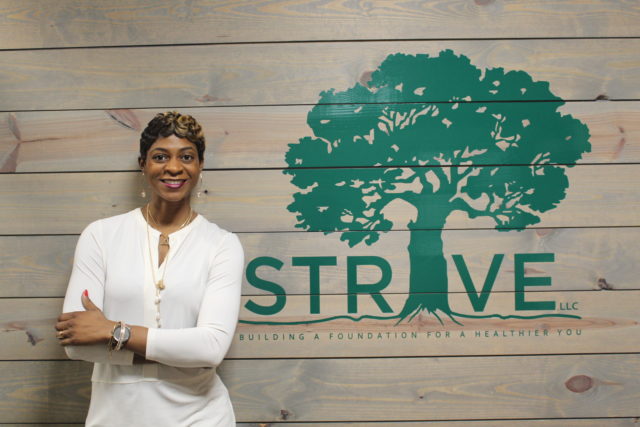
By Crystal Mullen-Johnson
Special to the Birmingham Times
Compared to women, men are less likely to receive mental health counseling. Instead of seeking any kind of treatment, men are more likely to deal with stress by overindulging in work, abusing alcohol, or binge watching sports.
Young men between the ages of 15 and 24, especially African American men, are at an increased risk for suicide. According to the U.S Department of Health and Human Services Office of Minority Health, African Americans are 10 percent more likely to report having extreme psychological discomfort than Non-Hispanic whites. The mortality rate from suicide for African American men was more than four times greater than for African American women, in 2014.
My favorite actor on the TV show The Young and the Restless is Kristoff St. John. He committed suicide on February 2, 2019. Neil Winters, played by Kristoff, appeared to be so happy and full of life. Neil was a romantic, the kind of guy you see and think, “I would like to marry someone like him because he looks attractive, possesses some great qualities, and appears to be physically and mentally healthy.”
Prior to Kristoff’s suicide, he was known for struggling off the set with mental illness. Kristoff’s son committed suicide in 2014, which led to Kristoff’s grieving and silent suffering. Delayed grief of a loved one can manifest into a mental illness if untreated.
Self-awareness
Mental health therapy helps people improve their self-awareness. It can also help them reprogram their brain patterns to better process situations and develop solutions to problems. When people use both objective resources and therapy, it helps them conquer their mental health issues, improve their problem-solving and conflict-resolution skills, and manage their emotions.
Down through the years, African American men and women have learned to suppress their pain and emotions and to “get over it” instead of discussing their troubles. The myth that one should “fake it till you make it,” distorts the reality of our problems. We become debilitated and internalize our problems by suffering silently. That behavior allows our internal suffering to be kept “under wraps.”
Laura Anderson, a former archivist for the Birmingham Civil Rights Institute and author of the book Civil Rights in Birmingham believes there is a heavy local legacy of collective failure to deal with trauma. She recalls what one hears in interviews with Birmingham residents who shared their memories of the many bombings in Birmingham over the years.
Of course, the 16th Street Baptist Church bombing that killed: Denise McNair, Carole Robertson, Addie Mae Collins, and Cynthia Wesley stands out. “From scores of interviews, one comes to understand that adults went to work the next day, students and teachers went to school the following day, all without opportunity to process a highly traumatic experience.”
Suffering In Silence
This is a great example of how African Americans developed a tolerance for trauma. Many believe we must be strong and courageous, and that life must go on without processing trauma. However, without processing trauma, people continue to suffer in silence.
Michael B. Jordan is another example of someone struggling with mental illness, but he was able to struggle less with the help of treatment. Jordan played a character in the movie Black Panther and stated that he began to sync with his character both on and off the set. The character was portrayed as violent and resentful, with vindictive motives. Michael disclosed that therapy was helpful in processing uncomfortable emotions so that he felt comfortable and in sync with his character on the set, and was able to be himself off the set.
Unfortunately, not all African Americans have access to mental health resources, and they also have to overcome barriers to access. Some reasons why African Americans have problems accessing mental health treatment are poverty, poor education, lack of insurance, and fear of being discovered. The myths ingrained in our culture also impair our judgment, which creates more stigma around mental health within our community.
The National Institute on Minority Health and Health Disparities (NIMHD) collaborated with Omega Psi Phi Fraternity to launch an educational outreach program called “Brother, You’re on My Mind.” According to NIMHD, “The focus [of the program] is to raise awareness about the mental health challenges associated with stress and depression that affect African American men and their families.”
Removing The Mask
One of the program’s goals is to communicate the importance of seeking help for mental health problems and to encourage affected individuals to get information, possibly by talking with their health care providers, in order to obtain appropriate treatment.
It is evident we have progressed as a culture economically and educationally. However, we still have great strides to make to improve mental health in our community. In the past, and still to this day, we are very comfortable wearing a mask with many layers of faces that we wear to appease others. By removing the mask, we can help ourselves achieve and reflect genuine peace of mind, happiness, and security.
Who will you be when you remove the mask that hides your layers of trauma, depression, anxiety, marital discord, and stress? Find out by making an appointment at Strive Counseling Services with a therapist today.
Crystal Mullen-Johnson is a Licensed Clinical Social Worker and a Registered Play Therapist in Birmingham, AL with more than 14 years of experience in providing counseling. Strive Counseling Services is a private practice located in downtown Birmingham that offers therapeutic mental health services to children (play therapy), adolescents, and adults. Strive offers evidence-based therapeutic modalities such as Cognitive Behavioral Therapy (CBT).
Visit these websites for mental health resources:
- Strive Counseling Services—http://www.strivebhm.com
- National Institute of Mental Health—http://www.nimh.nih.gov
- National Alliance on Mental Illness—http://www.nami.org
- American Psychological Association—http://www.apa.org




